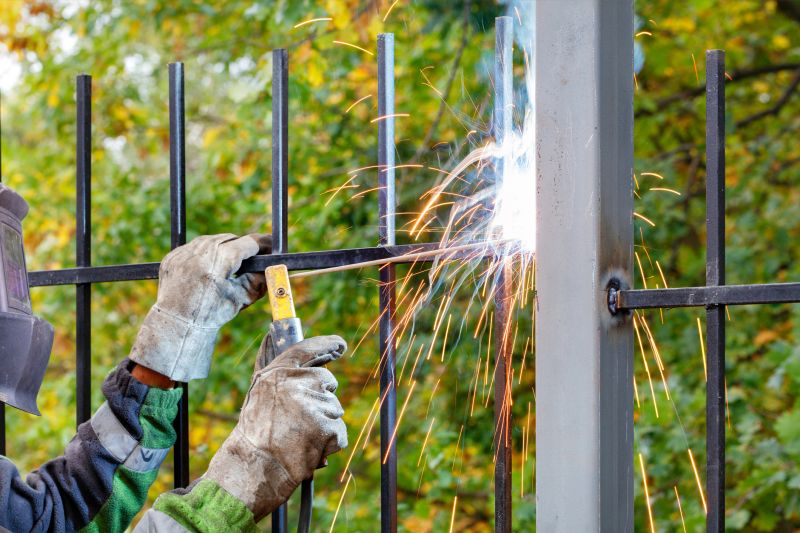Top-Rated Products For Fence Welding To Enhance Your Work
Choose from high-performance tools and supplies designed to optimize your fence welding process and outcomes.
 Fence welding products encompass a wide range of tools and materials designed to facilitate the secure and durable assembly of fencing systems. Whether constructing a simple wire fence or a complex metal enclosure, selecting the appropriate welding equipment is essential for achieving structural integrity and longevity. These products include various types of welding machines, such as arc welders, MIG welders, and TIG welders, each suited to different materials and project scales. In addition, accessories like welding helmets, gloves, and protective gear are critical for ensuring safety during the welding process.
Fence welding products encompass a wide range of tools and materials designed to facilitate the secure and durable assembly of fencing systems. Whether constructing a simple wire fence or a complex metal enclosure, selecting the appropriate welding equipment is essential for achieving structural integrity and longevity. These products include various types of welding machines, such as arc welders, MIG welders, and TIG welders, each suited to different materials and project scales. In addition, accessories like welding helmets, gloves, and protective gear are critical for ensuring safety during the welding process.
Top Overall Option
Multi-Functional Welding Machine
A versatile welding machine that supports multiple welding processes such as MIG, TIG, and arc welding. It offers adjustable settings suitable for various fencing materials and project sizes. Its portability and user-friendly interface make it a popular choice for both professionals and hobbyists. This all-in-one unit can help streamline fencing projects by providing reliable performance across different welding tasks.
Types of Products For Fence Weldings
MIG Welders
Ideal for quick and clean welds on wire and metal fencing, offering ease of use and speed.
TIG Welders
Suitable for precision welding on thinner metals, providing clean and detailed welds for decorative fencing.
Arc Welders
Versatile and capable of handling heavy-duty fencing materials, especially for structural supports.
Welding Helmets
Essential protective gear that shields eyes and face from sparks and UV radiation during welding.
Welding Gloves
Heat-resistant gloves designed to protect hands during welding and handling hot materials.
Welding Electrodes
Consumables used in arc welding to create strong welds on various metals.
Wire Feeders
Devices that supply wire for MIG welding, ensuring smooth and consistent welds.
Welding Clamps
Tools to hold metal pieces securely in place during welding for accurate assembly.
Grinding and Cutting Tools
Tools used to prepare metal surfaces and tidy up welds for a clean finish.
Welding Carts
Portable stands that organize welding equipment and supplies for easy access and mobility.
Popular Choices
Compact units favored for their ease of transport and suitability for various fencing projects.
Machines supporting both MIG and TIG welding, offering flexibility for different fence materials.
Popular for structural fencing and large-scale installations requiring robust welds.
Complete protective gear packages including helmets, gloves, and aprons for comprehensive safety.
Helmets with variable shading options for different lighting conditions during welding tasks.
Durable cables that facilitate movement and ease of use during fencing projects.
Wire used in MIG welding that provides deep penetration and is suitable for outdoor fencing work.
Power sources that enable welding in remote locations without access to mains electricity.
Electrodes designed specifically for steel fencing and structural components.
Tools to ensure proper tension in wire fences, often used alongside welding for reinforcement.
Devices for preparing metal surfaces to ensure optimal weld quality and adhesion.
Magnifying glasses designed for inspecting weld quality and detecting imperfections.
The choice of welding products often depends on the type of fencing material, the scale of the project, and the desired finish quality. For instance, MIG welders are popular for their ease of use and speed, making them suitable for both professional installers and DIY enthusiasts. Arc welders, on the other hand, are versatile and capable of handling thicker metals, which are common in heavy-duty fencing applications. Properly selecting and maintaining the right welding supplies can greatly influence the strength and appearance of the finished fence.
In fencing projects, the durability of welds directly impacts the overall stability and security of the structure. High-quality welding consumables, such as electrodes and wire feeds, contribute to cleaner, more consistent welds. Additionally, portable welding units enable flexibility and convenience, especially for on-site repairs or custom installations. Safety equipment should never be overlooked, as welding involves high temperatures and potential hazards. Investing in reliable protective gear ensures a safer working environment and helps maintain focus on precision and quality.
Overall, understanding the variety of products available and their specific applications can help users make informed decisions. From choosing the right welding machine to selecting compatible accessories, each component plays a vital role in successful fence welding projects. Proper preparation, technique, and safety measures are essential for achieving results that meet project requirements and ensure long-term performance.
Key Buying Considerations
- Type of welding process best suited for your fencing material and project scale.
- Power requirements and portability of the welding equipment.
- Material compatibility, including steel, aluminum, or wire mesh.
- Adjustability of settings for different thicknesses and types of metals.
- Safety features such as auto-shutdown, thermal overload protection, and ventilation options.
- Availability and ease of access to consumables like electrodes and wire feeds.
- Ease of use and learning curve for beginners versus experienced welders.
- Durability and build quality of the welding machine and accessories.
- Compatibility with existing tools and accessories in your workshop or on-site setup.
- Budget constraints balanced with the quality and features needed for your projects.
- Additional accessories such as clamps, helmets, and gloves that enhance safety and efficiency.
- Warranty and customer support from the manufacturer or supplier.
- Maintenance requirements and availability of replacement parts.
- User reviews and feedback to gauge real-world performance and reliability.
- Consideration of future project needs to ensure scalability and versatility.
